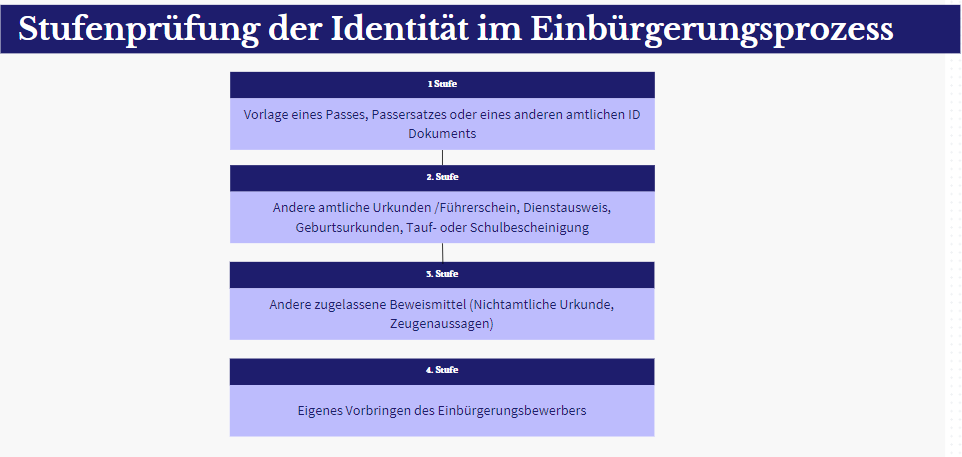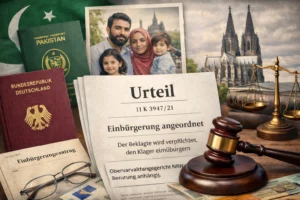Naturalization Law: Chinese Nationals Seek Naturalization Despite Unresolved Identity Issues
There is a comprehensive obligation for applicants seeking naturalization to cooperate in providing proof of identity, extending to the point of unreasonable burden. The following measures are therefore considered reasonable for naturalization applicants to undertake in order to procure appropriate evidence:
-
-
- Contacting family members, relatives, or acquaintances in the country of origin,
-
-
-
- Engaging a lawyer or a trusted attorney in the country of origin,
-
-
-
- Visiting the foreign representation of the country of origin (either personally or through a lawyer).
-
The naturalization applicant is required to take the initiative independently to prove their identity and to do everything possible and reasonable to provide the necessary evidence.

Facts of the Case:
The plaintiff in this case was a Chinese national of Tibetan ethnicity and Buddhist faith. She sought naturalization into German citizenship.
Plaintiff Entered Germany Without Identification Documents in Early 2009
She entered Germany in early 2009. To substantiate her asylum application filed in March 2009, she primarily stated that she had lived in a nunnery in Tibet, where she had been taken in at about five years old. She has had no family since then. She used her ordination name as her own, as she did not know her birth name. Her birth date was estimated by the nuns. There was only a nun identification card, as she had never possessed a personal identification document. She did not know if she was officially registered in China.
In July 2010, BAMF Denied the Application as the Plaintiff’s Identity Could Not Be Clearly Established In the asylum court proceedings, the plaintiff submitted a confirmation from the nunnery stating that she had been „ordained from a young age“ and registered as a nun in the monastery’s records. In March 2012, the Stuttgart Administrative Court obliged the Federal Republic to determine that the conditions of Section 60(1) of the Residence Act concerning the People’s Republic of China were met in the plaintiff’s case. The court reasoned that the plaintiff’s origin from China appeared sufficiently proven.
Despite the Lack of Identity Documents, the Plaintiff Was Granted Refugee Status
Consequently, in May 2012, BAMF determined that the conditions for granting refugee status concerning the People’s Republic of China were met. The travel document issued to the plaintiff for refugees included a note that the personal data was based on her own statements.
Plaintiff Applied for Naturalization While Retaining Her Chinese Nationality
In late September 2016, the plaintiff applied for naturalization in Germany while retaining her Chinese nationality. In addition to the monastery certificate previously submitted in the asylum proceedings, she provided a birth confirmation from „The Tibet Bureau, Office of the Representative of H. H. the Dalai Lama“ and a confirmation of her personal details from the Association of Tibetans in Germany e.V. In the administrative process, she stated that she was taken into the monastery at the age of three to five. The monastery mother later told her that her parents had been politically active and imprisoned. It was hopeless to learn anything about them. The application and appeal were unsuccessful. In the legal proceedings, the plaintiff also stated that at the age of twelve or thirteen, she had learned from a nun at the monastery that she had been left in a basket at the monastery door as a child.
Administrative Court Dismisses the Lawsuit as the Identity Could Neither Be Established Nor Clarified
The administrative court dismissed her lawsuit. Naturalization of the plaintiff into German citizenship was ruled out according to both Section 10(1) Sentence 1 of the Nationality Act (StAG) and Section 8(1) StAG, as her identity could neither be established nor clarified. The proof of identity could only be provided through a recognized foreign passport or substitute passport or through other official documents. Such documents were not available.
Plaintiff Filed an Immediate Appeal with the Federal Administrative Court Citing Violation of Federal Law
The plaintiff argued in her immediate appeal that Section 10(1) StAG violated the principle of proportionality, Article 20 of the Basic Law in conjunction with Articles 116 and 3 of the Basic Law, Articles 8 and 14 of the European Convention on Human Rights (ECHR), and Article 34 of the Geneva Convention. For naturalization applicants whose identity cannot be clarified from the outset and who have made all reasonable efforts to clarify their identity unsuccessfully, it should either be possible to waive the identity clarification or to allow proof of identity through non-official documents. Her identity had been established based on the submitted confirmations, and further clarification was neither possible nor reasonable. In particular, it was unreasonable to expect her to apply for a Chinese passport, as such contact would pose further danger to her, her remaining relatives in Tibet, and the nuns of the monastery.
Defendant Defends the Judgment, Arguing Identity Cannot Be Proven by Private Confirmations The defendant defended the challenged judgment, stating that identity could not be proven solely through an official identity document with a photograph but could also be proven through other suitable documents. However, private confirmations that generally affirmed identity without being able to trace how the identity was verified were not considered such documents.
Federal Administrative Court Sees Violation of Federal Law as Given
Federal Administrative Court Ruling:
Federal Administrative Court sees violation of federal law as given
The Federal Administrative Court ruled in favor of the plaintiff. The administrative court’s decision violated federal law (Section 137(1) No. 1 of the Administrative Court Procedure Act, VwGO) by assuming that proof of identity under Section 10(1) StAG and Section 8(1) StAG could only be provided through a recognized foreign passport or substitute passport or other official documents, provided that the accuracy of the connection between the person and the name was verified during issuance and that these documents were accompanied by a photograph. Due to insufficient factual findings, the legal dispute was referred back to the administrative court for further proceedings and decision (Section 144(3) Sentence 1 No. 2 VwGO).
Sufficient Clarification of Identity Is a General Requirement for Naturalization
Under Section 10(1) Sentence 1 StAG and Section 8(1) StAG, naturalization into German citizenship requires that the identity of the foreigner is clarified. The legislature has incorporated the jurisprudence of the Federal Administrative Court, which had previously established that clarification of the applicant’s identity was a mandatory requirement for naturalization under Section 10 StAG (Federal Administrative Court, Judgment of September 1, 2011, 5 C 27.10).
The clarification of identity serves important security-related concerns of the Federal Republic of Germany and is the starting point for examining other naturalization criteria. At the same time, the fulfillment of the strict requirements for proving identity must be objectively possible for a naturalization applicant who cooperates up to the limit of objective possibility and subjective reasonableness, even if they are in an unintentional evidentiary predicament. The security concerns associated with the requirement to clarify identity and the applicant’s right to be able to prove their identity must be balanced appropriately through a graduated examination. Such a graduated examination meets the requirements of higher-ranking law.
Identity Clarification Also Prevents Falsified Identities
With the requirement to clarify identity, the legislature pursues a security-related objective in nationality law. The identity-relevant personal details form the basis for examining several other naturalization criteria. With the entry into force of naturalization (Section 16 Sentence 1 StAG), a specific person with an identity recorded in the naturalization certificate is formally granted a new nationality. The public interest in preventing a person from being given a completely new identity or an additional alias identity, thus enabling them to operate in legal transactions with multiple different identities and official identity documents, requires that identity-relevant personal details undergo careful verification to ensure accuracy (Federal Administrative Court, September 1, 2011, 5 C 27.10).
The determination of the foreigner’s identity is also the starting and reference point for examining several naturalization requirements. On the one hand, it is an essential part of the status examination provided for in Section 10(1) Sentence 1 No. 4 StAG. On the other hand, identity verification is also a necessary prerequisite for the security check provided for in Section 10(1) Sentence 1 No. 5 in conjunction with Section 12a StAG and Section 11 StAG (Federal Administrative Court, Judgment of September 1, 2011, 5 C 27.10)..
The Requirements for Identity Clarification Must Be Designed to Ensure that Applicants Can Prove Their Identity
However, the constitutionally protected general right to privacy requires a limitation on the obligation to clarify identity.
From the point of view of future-oriented protection of development (see BVerfG, judgement of 5 June 1973, 1 BvR 536/72) as a basic condition of human personality, the general right of personality enshrined in Art. 2 para. 1 in conjunction with Art. 1 para. 1 GG requires that naturalisation applicants must have a realistic chance of clarifying their identity. Art. 1 para. 1 of the Basic Law requires that naturalisation applicants who will reside permanently in Germany must have a realistic chance of clarifying their identity. This must be taken into account when interpreting and applying the characteristic of clarification of identity within the meaning of § 10 para. 1 sentence 1 StAG and § 8 para. 1 StAG, because the desired German citizenship is the legal prerequisite for the civic status which, in addition to obligations, also conveys fundamental democratic rights and thus establishes congruence between those permanently subject to a particular state rule and the holders of democratic political rights (BVerfG, judgement 31 October 1990, 2 BvF 2/89).
The security interests of the Federal Republic of Germany underlying Section 10 (1) sentence 1 StAG and Section 8 (1) StAG and the constitutionally protected right of the naturalisation applicant to be able to clarify his or her identity must be appropriately balanced within the framework of a staged examination.
As a rule, the naturalisation applicant must provide proof of their identity by presenting a passport, or alternatively a recognised passport substitute or another official identity document with a photograph. If the applicant does not possess such an official identity document and it is objectively impossible or subjectively unreasonable to expect him/her to obtain it, he/she may also prove his/her identity by means of other suitable official documents, the issue of which is also subject to verification of the correctness of the connection between person and name, whether they are issued with a photograph or without one.
Therefore, the naturalisation applicant can also use other means of proof than a passport, etc.
If the naturalisation applicant is not in possession of other official documents and if it is objectively impossible or subjectively unreasonable to expect him to obtain them, the foreigner may use other means of evidence permitted under Section 26 (1) sentences 1 and 2 VwVfG to prove his identity. This includes, in particular, unofficial certificates or documents that substantiate personal details, including witness statements where applicable. However, the naturalisation authority may not demand or accept an affirmation in lieu of an oath in accordance with Section 27 (1) sentence 1 VwVfG, as such an affirmation is not provided for in the naturalisation procedure, contrary to Section 9 (2) sentence 2 of the Civil Status Act (PStG) of 19 February 2007, last amended by Art. 88 of the Ordinance of 19 June 2020.
In exceptional cases, the identity can also be proven solely by statements made by the naturalisation applicant.
If it is objectively impossible or subjectively unreasonable for the naturalisation applicant to rely on other evidence within the meaning of Section 26 (1) sentences 1 and 2 VwVfG, the identity of the naturalisation applicant may exceptionally be considered proven solely on the basis of his or her submission, provided that the naturalisation authority is convinced of the personal details on the basis of a comprehensive assessment of the circumstances of the individual case and the entire submission of the naturalisation applicant.
There is a kind of step-by-step model for clarifying identity
In order to form a conviction (§ 108 VwGO), a usable degree of certainty is required, which requires doubts to be silenced without completely excluding them (see BVerwG, judgement 16.4.1985, 9 C 109.84). The evidence to be taken into account must be consistent in itself and, when considered as a whole, be in line with the information provided by the naturalisation applicant about himself and other submissions.
A transition from one stage to a subsequent stage is only permissible if the naturalisation applicant is unable to provide proof of their identity despite sufficient cooperation. In accordance with Section 24 (1) sentence 1 VwVfG or, in administrative court proceedings, Section 86 (1) sentence 1 VwGO, the principle of investigation also applies with regard to the requirement to clarify identity. However, due to the fact that identity directly affects the sphere of the naturalisation applicant, this is restricted by the applicant's procedural obligation to cooperate. While the naturalisation authority primarily has a duty to provide information and provide impetus in this respect, the naturalisation applicant is subject to a duty to cooperate in accordance with Section 37 (1) sentence 2 StAG in conjunction with Section 82 (1) AufenthG. § Section 82 (1) AufenthG, the naturalisation applicant is subject to a comprehensive obligation to take the initiative and cooperate in clarifying their identity up to the limit of objective possibility and subjective reasonableness. They are obliged to take the initiative themselves to prove their identity and to do everything possible and reasonable to provide the necessary evidence. If he does not fulfil this obligation or not to the extent required, this must be taken into account when assessing the evidence. If evidence submitted by him proves to be falsified or genuine but incorrect in terms of content, this must also be taken into account in the assessment of the evidence, with weight being given to his disadvantage. If any remaining doubts about the accuracy of the personal details provided cannot be dispelled, the naturalisation applicant bears the burden of proof in this regard (BVerwG, judgement 1.9. 2011, 5 C 27.10).
This model of a staged examination of the identity of the naturalisation applicant meets the requirements of higher-ranking law, in particular Art. 3 para. 1 GG and Art. 34 GFK.
The tiered model takes appropriate account of the general principle of equality in Art. 3 para. 1 GG. This requires the legislator to treat essentially equal things equally and essentially unequal things unequally. It applies both to unequal burdens and to unequal benefits and also stands in the way of an exclusion of benefits contrary to equality, whereby a benefit is granted to one group of people but withheld from another group of people. Art. 3 para. 1 GG does not prevent the legislator from making any differentiation. However, any such differentiation must always be justified by objective reasons that are appropriate to the objective of the differentiation and the extent of the unequal treatment.
According to the graduated model, naturalisation applicants who find themselves in need of proof through no fault of their own are not treated less favourably than naturalisation applicants who are not subject to such a restriction in their ability to provide proof. This is because the former also have the opportunity to fulfil the requirement to clarify their identity without being asked to do the impossible or unreasonable.
The graduated model ensures that the public interests and the need for evidence of refugees entitled to protection are appropriately balanced and that they have a realistic chance of proving their identity.
Referral back due to lack of factual findings
The lack of sufficient factual findings prevents the Senate from determining whether the challenged judgment is correct for other reasons (Section 144(4) VwGO), just as it prevents a final decision in favor of the plaintiff (Section 144(3) Sentence 1 No. 1 VwGO).
The referral under Section 144(3) Sentence 1 No. 2 VwGO is necessary to give the administrative court the opportunity to base the individual assessment of the criterion of clarified identity on a sufficient factual basis. The court will have to decide, among other things, whether further promising investigative measures are possible and what level of cooperation can reasonably be required of the plaintiff. The possibility that the plaintiff might be officially registered in China under her monastery name could also be considered. If the administrative court again concludes that it is impossible or unreasonable for the plaintiff to provide an identity document or other suitable official documents, it will have to evaluate the confirmations submitted by the plaintiff from the „monastery […],“ the administrative office of „The Tibet Bureau, […],“ and the Association of Tibetans in Germany e.V. and possibly consider whether to require her to provide other non-official documents or records that could support her personal details. If the submitted confirmations are insufficient to clarify the plaintiff’s identity and it is impossible or unreasonable for her to rely on other evidence within the meaning of Section 26(1) Sentence 1 and 2 VwVfG, it must be considered whether her identity can be deemed clarified based on her statements.
Source: Federal Administrative Court
Important Note: The content of this article has been prepared to the best of our knowledge and belief. However, due to the complexity and constant evolution of the subject matter, we must exclude liability and warranty. Important Notice: The content of this article has been created to the best of our knowledge and understanding. However, due to the complexity and constant changes in the subject matter, we must exclude any liability and warranty.
If you need legal advice, please feel free to call us at 0221 - 80187670 or send us an email at or send an email to info@mth-partner.de info@mth-partner.de
Lawyers in Cologne advise and represent clients nationwide in immigration law.




